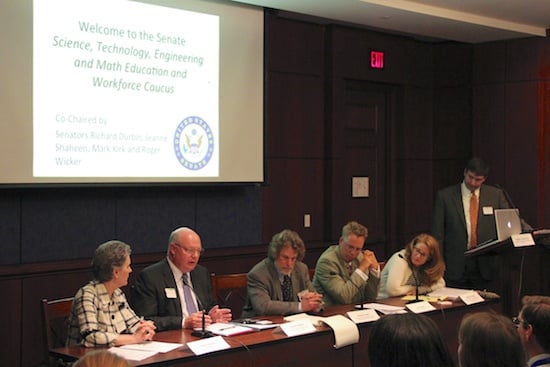OBAMA UNVEILS NEW PLAN TO BRING SCHOOLS AND STUDENTS INTO DIGITAL AGE
Just like kids shouldn’t be hitting chalk erasers together, teachers shouldn’t be writing on chalk boards either.  I mean, chalk is dirty, it gets everywhere and every time youhave to write on it you inevitably make that screeching noise with it. Don’t get me started with dry erase boards either, we’ll be here all day with that one.
I mean, chalk is dirty, it gets everywhere and every time youhave to write on it you inevitably make that screeching noise with it. Don’t get me started with dry erase boards either, we’ll be here all day with that one.
The Obama administration feels the same way about chalk/dry erase boards. At least I hope it does, which is why the President unveiled a new project called ConnectED which plans to get more electronic devices into the hands of teachers and students so that lessons can be taught digitally. Digitization of the classroom should lead to more engaged students, have less boredom, and better prepare them to compete in a highly industrialized economy. Tests are also digitized just like the lesson plans.
- 0 Comments
- Jul 1, 2013 5:30:00 PM
- Posted by Brendan Barnard
- Topics: STEM, Education, Education Politics
4 WAYS SCHOOLS CAN PREPARE FOR NEW TECHNOLOGIES IN THE CLASSROOM

Remember having to smash together chalk erasers when you got in trouble during class? It seems like an old punishment, but in fact some schools have been unable to adopt newer technologies, like white boards (or even more advanced: smart boards) in their classrooms. Despite how many times you personally had to clean the erasers, and how you may be fond of the taste of chalk dust, chalkboards (and thus their erasers) should be a thing of the past.
In a recent report, the Alliance for Excellent Education agrees, addressing four challenges that school leaders need to complete in order to give their students an advantage in the modern world and begin utilizing new digital learning and education technologies.
- 0 Comments
- Jun 28, 2013 11:00:00 AM
- Posted by Brendan Barnard
- Topics: Math, STEM, Education, Education Politics
6 TECHNOLOGY CHALLENGES EDUCATION IS FACING
If you’re reading this I’m pretty sure that I don’t have to tell you that we have a growing problem with our education system. There is a problem, but the first step to solving any problem is recognizing there is one; so we’re on the right track, right? The New Media Consortium also recognizes this and has put together "The NMC Horizon Report: 2013 K-12 Edition,” in hopes to identify problems with our approach to education technology. Below are the key issues they hope to have addressed.
- 2 Comments
- Jun 27, 2013 11:00:00 AM
- Posted by Brendan Barnard
- Topics: STEM, Education Politics
WHY YOU'RE NOT SMARTER THAN YOUR 5TH GRADER
Can you solve a problem involving slope-intercept? How about a quadratic equation? If you can’t that’s OK, typically our ability to recall how to solve problems like these gets weaker with time, especially without a strong STEM education background. Just think of how you feel when the more complicated questions come up on “Are you smarter than a 5th grader!” You know you learned that in school, but can you recall the answers off the top of your head now? It's OK if you can't.
- 0 Comments
- Jun 26, 2013 2:34:00 PM
- Posted by Brendan Barnard
- Topics: Math, STEM
CONGRESS HELPS PROMOTE STEM EDUCATION AND WORKFORCE CAUCUS
Do you often have nightmares about your kids asking you to help them with their math homework? Do you see your child get out their graphing calculator and suddenly you’re scrambling for an excuse to leave the room? This is actually nothing new, so you’re not alone. Just like previous generations, parents of generation Zs are overwhelmed by the level of advanced skills their children can comfortably complete. But this is a good sign as the days of working on an assembly line have been replaced by working on network servers and the blueprints of tomorrow’s workforce demands a more educated population.
- 0 Comments
- Jun 24, 2013 1:03:00 PM
- Posted by Brendan Barnard
- Topics: STEM, National News, Education Politics
Relevant Posts
Popular Posts
Subscribe to Email Updates
-
I Want To Learn MoreADDITIONAL INFORMATION


